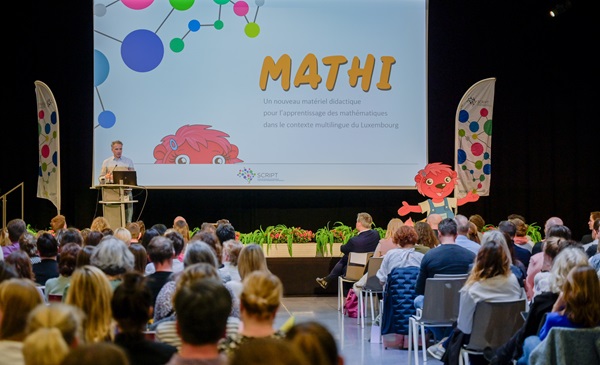 Luc Weis, director of the Educational and Technological Research and Innovation Coordination Service (SCRIPT), during the official launch of the MATHI material;
Credit: MENJE
Luc Weis, director of the Educational and Technological Research and Innovation Coordination Service (SCRIPT), during the official launch of the MATHI material;
Credit: MENJE
Luxembourg’s Ministry of Education, Children and Youth has announced that, at the start of the 2024-2025 school year, Luxembourg pupils in cycle 1 of primary school education will be taught mathematics using the MATHI method, a new series of teaching materials, and above all a new method of learning mathematics.
Luxembourg’s Minister of Education, Children and Youth, Claude Meisch, attended the official launch of the MATHI material on Tuesday 19 March 2024 at the Geesseknäppchen Campus in Luxembourg-Hollerich, in the presence of more than 500 teachers.
“Through this new material, we want to offer all students better teaching, in step with the times, but also more equitable in relation to the different linguistic situations of families. Because in the field of mathematics too, the gap in education is widening very strongly and very quickly,” announced Minister Meisch. Luxembourg’s Ministry of Education, Children and Youth, thus noted that intervening as early as possible is necessary to improve the chances of success for children.
Original material to combat educational inequalities
The MATHI material was developed to respond to several findings gathered during an inventory drawn up three years ago, based on the method in place, with 300 children, around a hundred teachers in the field and 60 experts from all walks of life (researchers from the University of Luxembourg, teachers from the National Education Training Institute (IFEN), regional directors of primary school education, representatives of the Skills Centres, etc.).
Firstly, students who do not speak Luxembourgish or German at home are initially disadvantaged in learning maths. Secondly, the delays accumulated in the first years make it very difficult to catch up beyond cycle 3. However, academic guidance is particularly linked to performance in mathematics.
Mathematical language, a language in its own right
The response provided by MATHI is a broad consideration of the multilingual situation in Luxembourg. The manuals will be available in German and French and will therefore be suitable for literacy either in German or French. In addition, teachers will have at their disposal a glossary of terms to use in German, French, English and Portuguese, to make the link from the start with the language spoken at home by the students. Another new feature: reasoning and thought processes are valued at least in the same way as the result.
A gradual introduction from cycle 1
Finally, an important area of development is the positive approach to mathematics from the very beginning, the ministry noted. “It’s no coincidence that we chose to start the series from cycle 1. At this age, no child is afraid of maths! Math is a fascinating science that can be proven in pictures and in action, even by children themselves. You just have to accompany them in this discovery by using their curiosity,” explained Professor Christiane Bentz, an expert from the Pädagogische Hochschule Karlsruhe, closely involved in the project. Children aged three to six are not yet inhibited by experiences of failure, they do not hesitate to express their thoughts and reasoning.
The new MATHI material will be introduced to cycle 1 of primary education starting in the upcoming school year. The series will then be gradually introduced until cycle 4.2, by 2030-2031.
For and by Luxembourg teachers
The teaching material was developed by the Department for the Coordination of Educational and Technological Research and Innovation (SCRIPT) of the Ministry of Education, Children and Youth with the help of teachers active in the field. “We are keen to offer a tailor-made tool for the Luxembourg system,” concluded Filipe Lima da Cunha, project coordinator.
The MATHI series is available in the form of manuals for students and teachers, activity binders and boxes of materials to carry them out. Digital applications will gradually enrich the series.








